|
|
|
Sort Order |
|
|
|
Items / Page
|
|
|
|
|
|
|
| Srl | Item |
| 1 |
ID:
157230
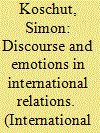

|
|
|
|
|
| Summary/Abstract |
The field of International Relations (IR) has recently witnessed the emergence of a wide variety of different approaches to make sense of the many ways emotions work in and through discourse. This forum takes stock of and investigates this link based on two interrelated questions: Why study emotions through discourse? How can we study emotions through discourse? Concerning the first question, we argue that textual and verbal utterances provide us with a promising way to make emotions empirically accessible for researchers. Regarding the second question, we argue that it is essential to develop specific criteria for the study of emotions via speech acts. We propose three criteria that the study of emotion discourse must answer to, which revolve around theory (what is an emotion?), expression (how are emotions communicated?), and effects (what do emotions do?). In a step toward fostering engagement and dialogue on these questions, the contributors of this forum propose a variety of approaches to study emotion discourse in world politics. The idea is to explore the ways in which discourse evokes, reveals, and engages emotions and how these effects can speak to larger questions in IR. Precisely, the goal with this forum is to go beyond the “emotions matter” approach of the first wave of emotions scholarship in IR to offer more specific ways to integrate the consideration of emotion into existing research, particularly that of a constructivist vein.
|
|
|
|
|
|
|
|
|
|
|
|
|
|
|
|
| 2 |
ID:
135292
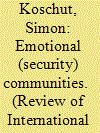

|
|
|
|
|
| Summary/Abstract |
What do Al-Qaeda, Human Rights Watch, and NATO have in common? They can all be understood as emotional communities. Emotional communities are ‘groups in which people adhere to the same norms of emotional expression and value – or devalue – the same or related emotions’. This article develops a conceptual framework for a particular type of emotional community in world politics: a security community. It is argued that emotion norms – the expression of appropriate emotions in a given situation – stabilise a security community during inter-allied conflict. The argument is illustrated by an empirical case study of NATO's military intervention in Libya in 2011. The article shows how the conceptualisation of security communities as emotional communities has significant implications for the study of regional peace and security.
|
|
|
|
|
|
|
|
|
|
|
|
|
|
|
|
| 3 |
ID:
160808
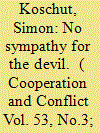

|
|
|
|
|
| Summary/Abstract |
Constructivists claim that the democratic peace is socially constructed via mutual recognition between liberal subjects. Mutual recognition is rooted in shared moral attitudes and cognitive perceptions, thereby creating liberal intersubjectivity. What is largely missing from these accounts is the fact that shared meanings and identities are not solely rooted in cognitive perceptions and moral attitudes but significantly depend upon shared emotions that underpin and reproduce intersubjectivity. Building on interdisciplinary insights from social constructivist emotion theories, it is argued here that collectively shared emotions provide a way by which liberal subjects choose particular meaning frames and interpretations, which help align and sustain mutual attitudes and perceptions in constructing categories of ‘us’ and ‘them.’ Accordingly, the theoretical question concerning how liberal democracies recognize each other as friends can be more fully answered by the high degree of emotional convergence among them. Moreover, I suggest that it is precisely this emotional convergence that underpins the way liberal selves construct non-liberal others as their enemies.
|
|
|
|
|
|
|
|
|
|
|
|
|
|
|
|
| 4 |
ID:
138769
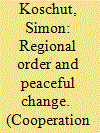

|
|
|
|
|
| Summary/Abstract |
The security community concept generally inhabits a rather small niche in the study of International Relations, as the logic of community fundamentally challenges the prevailing logic of anarchy. In this article, it is argued both on ontological and theoretical grounds that the concept’s intellectual heritage and depth transcends the boundaries of existing theories. In this sense, the concept of security community serves as a via media by linking different strands of International Relations theory together and by bridging various theoretical gaps. This argument will be developed in two steps. Firstly, it will be shown that the security community framework developed by Karl W Deutsch is deeply rooted in International Political Theory without belonging to one particular branch. By locating the concept in International Political Theory, an exercise that has been neglected by the security community literature; it will be secondly demonstrated that the concept of security community takes the middle ground between specific strands of International Relations theory, as these strands are ultimately based on concepts of moral philosophy.
|
|
|
|
|
|
|
|
|
|
|
|
|
|
|
|
| 5 |
ID:
152105
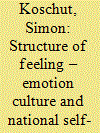

|
|
|
|
|
| Summary/Abstract |
Why do individuals sacrifice themselves to defend a nation-state? This article emphasises the link between emotion and culture by investigating the affective reproduction of culture in world politics. Building on the tradition of Émile Durkheim, it introduces the concept of emotion culture to IR. Emotion cultures are understood as the culture-specific complex of emotion vocabularies, feeling rules, and beliefs about emotions and their appropriate expression that facilitates the cultural construction of political communities, such as the nation-state. It is argued that emotions provide a socio-psychological mechanism by which culture moves individuals to defend a nation-state, especially in times of war. By emotionally investing in the cultural structure of a nation-state, the individual aligns him/herself with a powerful cultural script, which then dominates over other available scripts. The argument is empirically illustrated by the case of the so-called Japanese kamikaze pilots.
|
|
|
|
|
|
|
|
|
|
|
|
|
|
|
|
| 6 |
ID:
132055
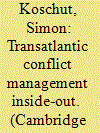

|
|
|
|
|
| Publication |
2014.
|
| Summary/Abstract |
This article explores the impact of domestic norms on regional security practices in a pluralistic security community in the transatlantic area. A security community is considered to be 'a group which has become integrated, where integration is defined as the attainment of a sense of community, accompanied by formal or informal institutions or practices, sufficiently strong and widespread to assure peaceful change among members of a group with "reasonable" certainty over a "long" period of time' (Karl W Deutsch, Sidney A Burrell, Robert A Kann, Maurice Lee Jr, Martin Lichterman, Raymond E Lindgren, Francis L Loewenheim and Richard W Van Wagenen (1957) Political community and the North Atlantic area: international organization in the light of historical experience (Princeton, New Jersey: Princeton University Press)). Recent studies have aligned the concept of security community with the practice turn in International Relations theory. Although practice theory is able to explain peaceful conflict resolution within a security community, this article shows that its explanatory power is significantly weaker when it comes to military interventions outside the security community. The article theoretically and empirically investigates this argument by using the empirical case of extraregional conflict management in Afghanistan. The importance of domestic norms in constructing and perceiving regional security practices in out-of-area operations emphasizes the 'local' over the 'regional' as a crucial driver behind the emergence of a regional actor's understanding of security and thus for the formation and consolidation of regional peace.
|
|
|
|
|
|
|
|
|
|
|
|
|
|
|
|
|
|
|
|
|